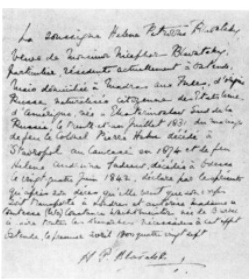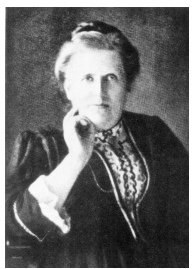301
H. P. BLAVATSKY’S INSTRUCTIONS TO COUNTESS CONSTANCE WACHTMEISTER, CONCERNING THE REMOVAL OF HER BODY AFTER DEATH
[In the early spring of 1887, H.P.B., while at Ostende, became gravely ill. With her kidneys badly infected, she was unconscious for hours at a time. Countess C. Wachtmeister, who was living with H.P.B. at the time, summoned Mrs. Marie Gebhard from Elberfeld and Doctor Ashton Ellis of the London Lodge. A consultation between the latter and H.P.B.’s attending Belgian physician revealed very little hope of recovery. It was decided that H.P.B. would make her Will and that it would be signed in the presence of the two doctors, a lawyer, and the American consul. Before this plan could be carried out, and apparently during the night following upon this decision, H.P.B. was restored to relative health by her Master who had come that night and healed her. She had been given a choice between dying and living to finish The Secret Doctrine. She was shown the difficulties and sufferings she would have to go through in England where she was supposed to go. She chose to remain at her post and continue her work. The next day, the Will was made and signed as planned. For a while, this Will must have been in the hands of H.P.B.’s lawyer at Ostende. After H.P.B.’s passing, May 8,1891, Countess C. Wachtmeister saw the lawyer and was told that at one time he had given the Will back to H.P.B. She must have destroyed it at the time, as it was never found among her papers. Another Will drawn up later took its place (Vide C. Wachtmeister, Reminiscences, PP. 71-75).
It is quite probable that it was at this time that H.P.B. had someone write out on an ordinary piece of letter-paper her directives as to the removal of her body after death. This document is possibly in Countess C. Wachtmeister’s handwriting and is drawn up in French. It is signed by H.P.B. in pen and ink, with the addition of the three dots. The document was for a long time in the possession of Count Raoul-Axel Wachtmeister (1865-1947), the son of Count Carl Wachtmeister and Constance Georgina (de Bourbel) Wachtmeister. He gave it to his friend Axel Fredenholm, of Gothenburg, Sweden; the latter deposited it in the Archives of the Compiler of the present Series. The original French text of H.P.B.’s directives is as follows:]
302 La soussigné Helena Petrovna Blavatsky, veuve de Monsieur Nicephor Blavatsky, particulier, résident actuellement à Ostende, mais domiciliée à Madras aux Indes, d’origine Russe naturalisée citoyenne des États Unies d’Amérique, née à Ekaterinoslav Sud de la Russie, le trente-et-un Juillet 1831 du mariage de feu le Colonel Pierre Hahn décédé à Stavropol au Caucase en 1874 et de feu Helene Andrevna Fadeew, décédée à Odessa le vingt-quatre Juin 1842, déclare par les présents qu’après son déces qu’elle veut que son corps soit transporté à Londre et autorise Madame la Comtesse (Wa) Constance Wachtmeister née de Bourbel à faire toutes les démarches nécessaires à cet effet. Ostende, le premier avril 1800 quatre vingt sept.
H. P. Blavatsky...
[We have kept unaltered certain inaccuracies of French. “Soussigné,” in the first line, should have two “e”s; “résident” should have an “a” in the last syllable; “Unies” should have no “e” in it; “feu” should have an “e” in the feminine form; and “déces” should be “décès.”]
303
304
The undersigned, Helena Petrovna Blavatsky, widow of Mr. Nikifor Blavatsky, [1] a civilian residing presently at Ostende, though domiciled at Madras, India, of Russian origin, naturalized in the United States of America, born at Ekaterinoslav, South Russia, the thirty-first of July, 1831 [old style], of the marriage of the late Colonel Peter Hahn,[2] deceased at Stavropol, Caucasus, in 1874, and of the late Helena Andreyevna Fadeyev,[3]
305
deceased at Odessa, the twenty-fourth of June, 1842, declares by these presents that she wishes her body to be taken, after her death, to London, and authorizes Madame the Countess (Wa) Constance Wachtmeister, born de Bourbel, to make all the necessary arrangements to this effect. Ostende, the first of April, 1800 and eighty seven.
H. P. BLAVATSKY∴
Footnotes
- ↑ [Nikifor Vassilyevich Blavatsky, whom H.P.B. married in the summer of 1849. He was a descendant of an old Ukranian family originally named Blavatko. He was made Vice-Governor of the then newly constituted Province of Erivan’ in the Caucasus. The date of his passing has not been definitely ascertained, but the most likely period is after 1877. See Vol. I, p. xxxvi.—Compiler.]
- ↑ [Peter Alexeyevich von Hahn was the son of Lieutenant-General Alexey Gustavovich Hahn von Rottenstern-Hahn and Elizabeth Maksimovna, née Countess Probsen. The General had been a famous figure in the Army of Fieldmarshal Suvorov, had crossed the Alps at a spot known as the Devil’s Bridge, in the St. Gotthard Pass, and became Commander of the town of Zürich in Switzerland, during the period of occupation. According to existing evidence, he must have died before 1830. His father, Gustav, immigrated into Russia at the beginning of the 17th century, being directly related to the Count von Hahn in Mecklenburg, Germany. Peter Alexeyevich, H.P.B.’s father, was born in 1798, and died at Stavropol’, North Caucasus, sometime in the summer of 1873. He was buried there, according to H.P.B.’s own statement (vide her letter to Alexander N. Aksakov, dated Dec. 3, 1874, in Solovyov’s Modern Priestess of Isis). He served for many years in Horse-Artillery; after retiring, with the rank of Colonel, he became Postmaster-General of the District of Grodno. There existed a very close tie between H.P.B. and her father, and he kept her supplied with means during most of her world-wide travels.—Compiler.]
- ↑ [Helena Andreyevna de Fadeyev (1814-1842), H.P.B.’s mother, was the daughter of Privy Councillor Andrey Mihaylovich de Fadeyev (1789-1867), Governor of the Province of Saratov, and later Director of the Department of State Lands in the Caucasus, and of Helena Pavlovna, née Princess Dolgorukova. The latter was a very remarkable person. She was a noted botanist, a woman of unusual scholarly attainments and of great culture, which was very rare for a woman of that period of Russian history. She was in correspondence with a number of scientists, among them Sir Roderick Murchison (1792-1871), British geologist and one of the Founders of the Royal Geographical Society, who went on an extensive geological expedition to Russia. She spoke five foreign languages and was an excellent painter. Her valuable herbarium was presented after her death to the University of St. Petersburg.
Helena Andreyevna was the eldest daughter of the above-mentioned couple. Very early in life, she became a noted novelist, her first work being published when she was only 23. Her marriage was not a happy one, mainly due to incompatibility and the inability on her part to fit into the narrow groove of her husband’s military life. In her novels, she pictured the wretched position of women, their lack of opportunities and education, and raised the problem of their ultimate emancipation. She was the first woman in Russia to do it by literary means. Her best works are Utballa, Jelalu’d-Din, Theophany Abbiagio, and Lubonka. She wrote under the pseudonym of Zinaida R—. She died at the age of 28, and was hailed by the greatest Russian literary critic Byelinsky as a “Russian George Sand.”—Compiler.]

